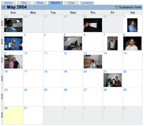:: Sunday, May 30, 2004 ::
 ORIGINAL POST: Saturday, May 29, 2004
ORIGINAL POST: Saturday, May 29, 2004
BY: Garrett Lynch
SETI@home, the "scientific experiment that uses Internet-connected computers in the Search for Extraterrestrial Intelligence (SETI)" turned five years old on May 17th 2004. The application that collates data on users computers while they are not in use, essentially repurposing the redundant concept of a screensaver, rapidly became known as the best and most widely used example of a term classified as "Distributed Computing". With ever diminishing monetary support in the states for research such as the search for extraterrestrial intelligence and ever rising amounts of information to process, researchers and scientists were faced with the problem of finding a solution of enough computing power to assist them in their continued search....
"Most of the SETI programs in existence today, including those at UC Berkeley build large computers that analyze that data from the telescope in real time. None of these computers look very deeply at the data for weak signals nor do they look for a large class of signal types (which we'll discuss further on). The reason for this is because they are limited by the amount of computer power available for data analysis. To tease out the weakest signals, a great amount of computer power is necessary. It would take a monstrous supercomputer to get the job done. SETI programs could never afford to build or buy that computing power. There is a trade-off that they can make. Rather than a huge computer to do the job, they could use a smaller computer but just take longer to do it. But then there would be lots of data piling up. What if they used LOTS of small computers, all working simultaneously on different parts of the analysis? Where can the SETI team possibly find thousands of computers they'd need to analyze the data continuously streaming from Arecibo? The UC Berkeley SETI team has discovered that there are already thousands of computers that might be available for use. Most of these computers sit around most of the time with toasters flying across their screens accomplishing absolutely nothing and wasting electricity to boot. This is where SETI@home, (and you!), comes into the picture. The SETI@home project hopes to convince you to allow us to borrow your computer when you aren't using it and to help us "…search out new life and new civilizations." We'll do this with a screen saver that can go get a chunk of data from us over the internet, analyze that data, and then report the results back to us. When you need your computer back, our screen saver instantly gets out of the way and only continues its analysis when you are finished with your work."
Now while the use of this idea, its purpose might prove to be a bit too much on the side of Geek Chic for many, like something out of the X-Files, don't be fooled, the idea itself and its implications are astonishing. An application that that can be downloaded and installed on an infinite number of computers, that can communicate with a server and break data down into segments, packets, which can be processed sent back and reassembled in order with no loss of information or oversight. Essentially using the idle time of a resource (computers connected to the internet) that continues to expand at enormous rate, its no surprise that SETI@home has many admirers across the computing community with many being net / new media artists -- This writer being one.
SETI@home can be downloaded from the Berkeley University website here.
 ORIGINAL POST: Tuesday, May 25, 2004
ORIGINAL POST: Tuesday, May 25, 2004BY: Eduardo Navas
The private/public dichotomy is constantly being redefined by emerging online technologies. The most obvious examples of this are blogs, of course, which are now changing web-surfing due to their accessibility via RSS feeds. Now online users can access customized personal information whenever their favorite blogs are updated. So, people can easily share their thoughts online, which, in a past not too far away, could have been private entries in a journal. Of course knowing that others might read one's thoughts taints the way the entry will be written, and this obviously is a symptom of the private arena becoming more and more blurry--people are craving online attention. So, everyone can be a media-star, which means that everyone can also be simply noise.
Other types of online activities that are also affecting the private/public dichotomy are online communities like Friendster and Orkut. These communities are probably familiar to our readers by now, but one that may not be as popular is JussPress. This particular website, which was originally developed as a research project at UCSD, offers unlimited upload of images. What makes JussPress different from the other communities is its emphasis on imaging, on sharing documentation of activities, as opposed to information that can be complemented with images.
Since the project was originally developed in a research institution, one should wonder how it could certainly become a great archive for later use by ethnographers and social/cultural critics to understand trends of behavior during the early days of network development. In other words, it shows that cultures are becoming more efficient in developing tools that makes their historization and analysis readymade for future generations to study, and certainly this kind of resource is a dream come true for marketing strategists in contemporary times. The latter is not the aim of the project obviously, but the technology used is certainly friendly to marketing development. Of course this is considering that such queries do not infringe on people's private lives.
Oh, I am sorry! I forgot, the line between private/public is constantly being redefined: recently, an acquaintance commented that if one is willing to upload information to free-online-communities, then these entities should have the right to use submitted material as they want to, because they are providing a free service... While I think one can (and maybe should) join these communities in good spirit, being wary of iliberal ideology like the one I just mentioned is really what needs to be put into practice by online users.
 ORIGINAL POST: Monday, May 24, 2004
ORIGINAL POST: Monday, May 24, 2004BY: ana boa-ventura
Happy 1st anniversary to Kabum! in Brazil
I've always been fascinated with the way we translate words. "Digital divide" is an interesting case in point... It's rather negative... Yet, the same concept has materialized in very different "forms" in other countries, such as in Brazil where people talk of "inclusao digital".
The project I will now tell you about - Kabum! - is all about inclusion and has nothing to do with divide...
In May 2003, the prestigious Brazilian designer Gringo Cardia founded the project with the Instituto Telemar (Escola do Futuro, University of S. Paulo, Brazil). The project was aimed at "underprivileged" children (now... that's a word that needed to be eradicated from its mother language...) from 25 different communities of "favelas" (very poor neighborhoods) of Rio. These students have been working in projects mixing art and technology, and as an example I will mention here the projections they did for one of the SKANK music shows (www.skank.com.br).
One year later, the project is being brought to Recife, in the Northeast of Brazil (Nordeste). This is a region with tremendous problems of poverty and lack of infrastructures.
This new stage of Kabum! has been described as the first attempt to bring the concept of "art+technology" to the Nordeste. Cardia says that while popular art will always have all its value, the acquisition by this young people of notions of aesthetics and technological skills, will open new doors for them.
Of the project, Cardia says:
"Many people who master a computer end up doing print work, with no artistic or aesthetic notions. Here [Kabum!] we will be empowering young people not only artistically but also technologically".
For those who speak Portuguese:
http://www.institutotelemar.org.br/
detalhes_noticia_destaque.asp?
Str_Pg_Origem=oficinas&Int_not_
dest_cod=45&Int_Pagina=1
For those who don't:
The URL above points to the article on "Kabum! – “An unprecedented social-educational project" that describes several projects the students of Kabum!, mostly coming from the favelas they have been involved with.